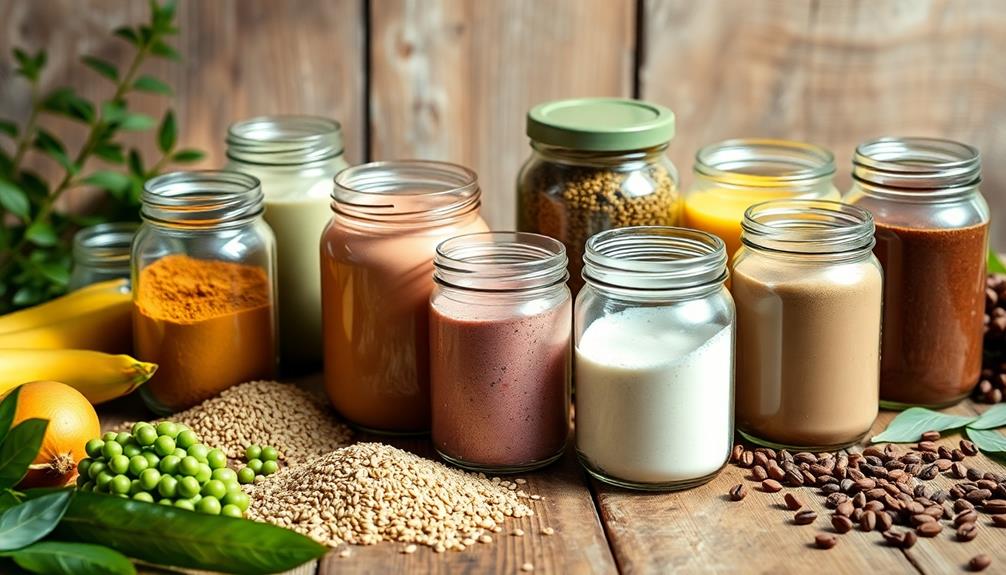Are you tired of sifting through countless protein powders, unsure which ones are truly organic and effective? The search for the perfect organic protein powder can be overwhelming, but fear not! You've got great options. Orgain's Vanilla Bean and Chocolate Fudge flavors offer 21g of plant-based protein per serving, while their Superfoods blend packs in 50 organic superfoods. If you prefer whey, Levels Grass Fed Whey delivers 24g of protein with no added sugars. For athletes, Garden of Life's Vegan Sport Protein boasts 30g of complete protein and NSF certification. These powders are USDA organic, free from artificial additives, and cater to various dietary needs. Consider factors like taste, mixability, and value when choosing. There's more to unpack about these protein-packed powerhouses!
Key Takeaways
- Orgain Organic Vegan Protein Powder offers 21g of plant protein and smooth texture in vanilla and chocolate flavors.
- Garden of Life Organic Vegan Sport Protein Powder provides 30g of complete protein and is NSF certified for sport.
- Orgain Organic Vegan Protein + 50 Superfoods Powder combines 21g protein with 50 organic superfoods for enhanced nutrition.
- Levels Grass Fed Whey Protein Powder delivers 24g of protein per serving with no added sugars or artificial ingredients.
- Look for USDA Organic certification, high protein content (20-30g per serving), and good mixability when choosing organic protein powders.
Orgain Organic Vegan Protein Powder, Vanilla Bean
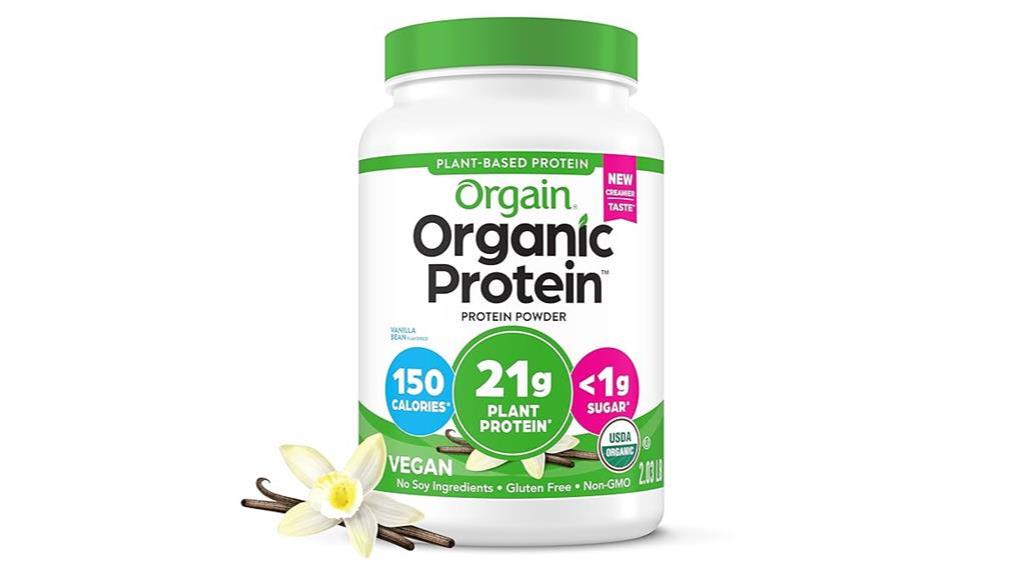
Orgain Organic Vegan Protein Powder, Vanilla Bean is an ideal choice for health-conscious individuals seeking a plant-based protein supplement. You'll get 21g of plant protein and 6g of prebiotic fiber in each 150-calorie serving. It's a versatile powder that blends smoothly into shakes, smoothies, or baked goods.
This USDA-certified organic powder packs a nutritional punch with organic peas, brown rice, and chia seeds. It's free from common allergens and artificial additives, making it suitable for various dietary needs. You'll love the smooth, creamy vanilla flavor that doesn't leave a gritty aftertaste. Many users report improved eating habits and weight management when incorporating this powder into their daily routine. Whether you're looking for a post-workout boost or a meal replacement on busy days, Orgain's protein powder has got you covered.
Best For: Health-conscious individuals, vegans, and those seeking a clean, plant-based protein supplement for weight management, meal replacement, or post-workout nutrition.
Pros:
- High-quality, organic ingredients with 21g of plant protein per serving
- Versatile use in shakes, smoothies, and baked goods
- Free from common allergens and artificial additives
Cons:
- May be expensive compared to non-organic protein powders
- Some users might find the taste too sweet or artificial
- Limited flavor options (only available in Vanilla Bean)
Orgain Organic Vegan Protein Powder, Chocolate Fudge Flavor
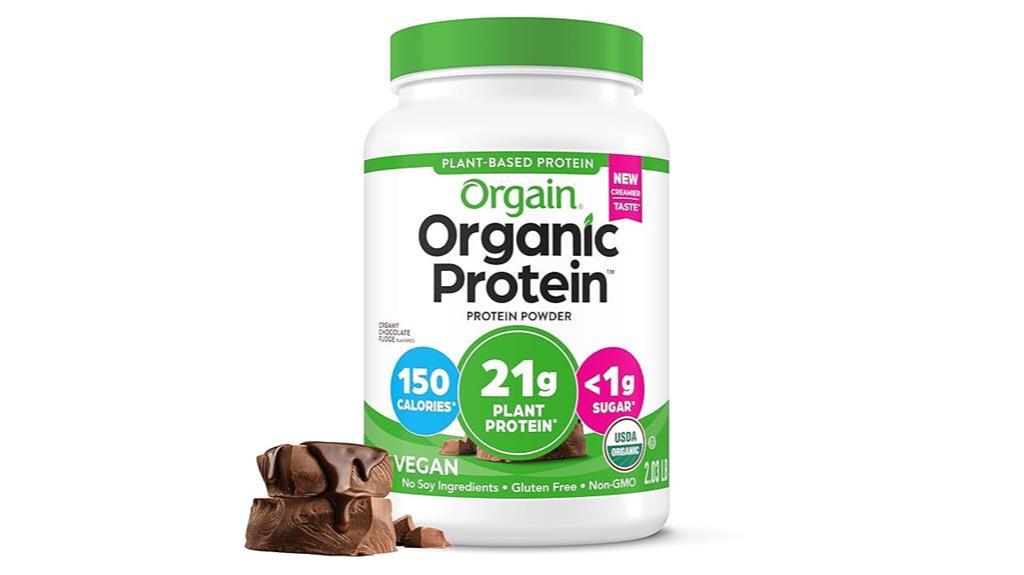
For health-conscious individuals seeking a plant-based protein boost, this chocolate fudge-flavored powder packs a nutritional punch. You'll get 21g of protein from organic peas, brown rice, mung beans, and chia seeds in each serving. It's not just about protein, though – you're also getting 7g of prebiotic fiber for gut health. Plus, it's vegan, gluten-free, and free from artificial additives.
Mix it with your favorite plant milk or blend it into smoothies for a delicious post-workout shake or meal replacement. It's versatile enough to add to overnight oats or baked goods, too. While some users find it a bit gritty when stirred by hand, most rave about its smooth texture and great taste when blended. You might find the price a bit steep, but many customers swear it's worth every penny for its quality and flavor.
Best For: Health-conscious individuals seeking a high-quality, plant-based protein powder with great taste and clean ingredients for post-workout recovery or meal replacement.
Pros:
- Packed with 21g of organic plant protein and 7g of prebiotic fiber per serving
- Versatile for use in shakes, smoothies, baked goods, and more
- Free from artificial additives, gluten, soy, and suitable for various dietary needs
Cons:
- Higher price point compared to some other protein powders
- Can be gritty when mixed by hand, best results achieved when blended
- Some users find the container size misleading in terms of value
Orgain Organic Vegan Protein + 50 Superfoods Powder (Creamy Chocolate Fudge)
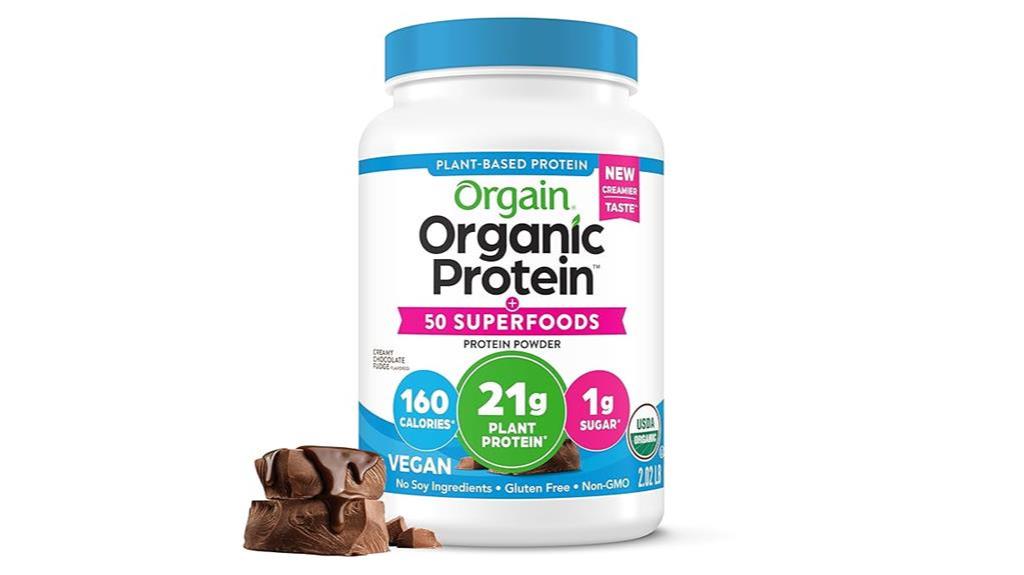
Health-conscious individuals seeking a nutrient-dense protein powder will find Orgain's Organic Vegan Protein + 50 Superfoods Powder an excellent choice. You'll get 21g of plant-based protein, 10g of prebiotic fiber, and a whopping 50 organic superfoods in every serving. It's like a nutritional powerhouse in a glass!
This USDA Organic, gluten-free, and vegan powder isn't just about protein. You're also getting a hefty dose of vitamins and minerals for immune support. Mix it with your favorite milk alternative or blend it into smoothies for a tasty, nutrient-packed treat. And if you're feeling adventurous, why not toss some into your baked goods? Your brownies will never know what hit 'em! With its creamy chocolate fudge flavor and smooth texture, you'll forget you're drinking something so good for you.
Best For: Health-conscious individuals, athletes, and vegans looking for a nutrient-dense, plant-based protein powder with added superfoods and great taste.
Pros:
- Packed with 21g of plant-based protein and 50 organic superfoods per serving
- USDA Organic, vegan, gluten-free, and free from artificial ingredients
- Versatile for use in shakes, smoothies, and baked goods
Cons:
- May be expensive compared to simpler protein powders
- Some users might find the taste too sweet or artificial
- Contains 1g of sugar, which might not suit those on strict low-sugar diets
Levels Grass Fed Whey Protein Powder (Chocolate, 5LB)
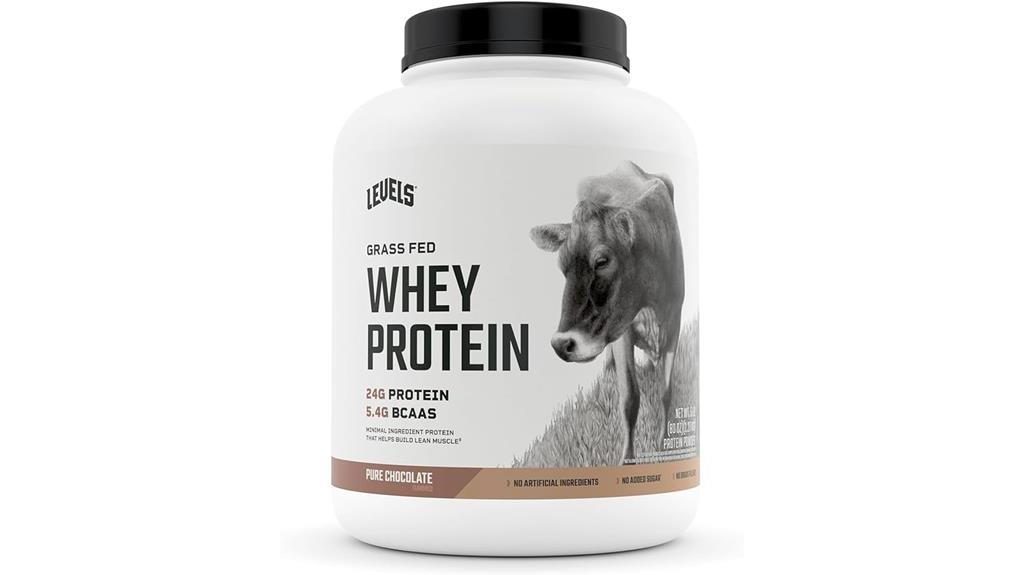
Fitness enthusiasts seeking a clean, grass-fed protein source will find Levels Grass Fed Whey Protein Powder an appealing option. With 24g of protein and 5.4g of BCAAs per scoop, it's packed with muscle-building goodness. You'll appreciate the absence of added sugars, artificial flavors, and sweeteners, making it a health-conscious choice.
While the taste has received mixed reviews, you might enjoy the mild sweetness from monk fruit extract. It's easy to mix, though you may need to blend it thoroughly to avoid clumps. Keep in mind that some users report digestive issues, so listen to your body. One concern to reflect on is the company's lack of transparency regarding heavy metal testing, which might give you pause. Overall, if you're looking for a minimally processed, hormone-free protein powder, Levels could be worth a try.
Best For: Health-conscious fitness enthusiasts seeking a clean, minimally processed, grass-fed whey protein powder without artificial additives.
Pros:
- High-quality protein source with 24g of protein and 5.4g of BCAAs per scoop
- Free from hormones, GMOs, soy, gluten, and artificial sweeteners
- Easy to mix and versatile for use in various recipes
Cons:
- Mixed reviews on taste, with some flavors potentially lacking or being overly sweet
- Some users report digestive issues like bloating and stomach discomfort
- Lack of transparency regarding third-party heavy metal testing reports
Garden of Life Organic Vegan Sport Protein Powder (Vanilla)
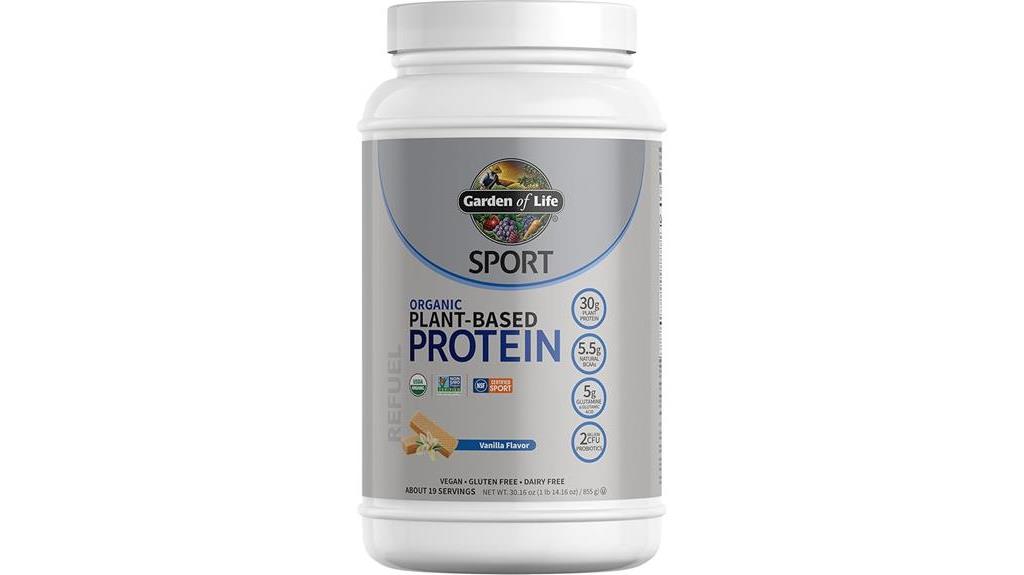
Athletes and fitness enthusiasts committed to organic, plant-based nutrition will find Garden of Life's Organic Vegan Sport Protein Powder in Vanilla a top-tier choice. This USDA organic, non-GMO verified powder packs a punch with 30g of complete protein per serving. You'll appreciate its clean ingredient list and absence of common allergens like gluten, dairy, and soy. With 19 servings per container, you're getting a high-quality protein source that's NSF certified for sport.
While it's pricier than some options at about $2.25 per serving, you're paying for quality and certifications. The powder mixes well in a blender and has a pleasant vanilla flavor that users rate highly. It's versatile enough for smoothies, shakes, and even baking. Plus, you'll benefit from added probiotics and antioxidants, supporting your immune system and recovery.
Best For: Athletes and health-conscious individuals seeking a high-quality, organic, plant-based protein powder with multiple certifications and added nutritional benefits.
Pros:
- High protein content (30g per serving) with complete amino acid profile
- Certified organic, non-GMO, and sport-approved with added probiotics and antioxidants
- Pleasant vanilla taste and versatile for various uses (shakes, smoothies, baking)
Cons:
- Higher price point compared to some other protein powders
- May have a slightly gritty texture compared to whey protein
- Can clump when mixed without a blender
Factors to Consider When Choosing Organic Protein Powders
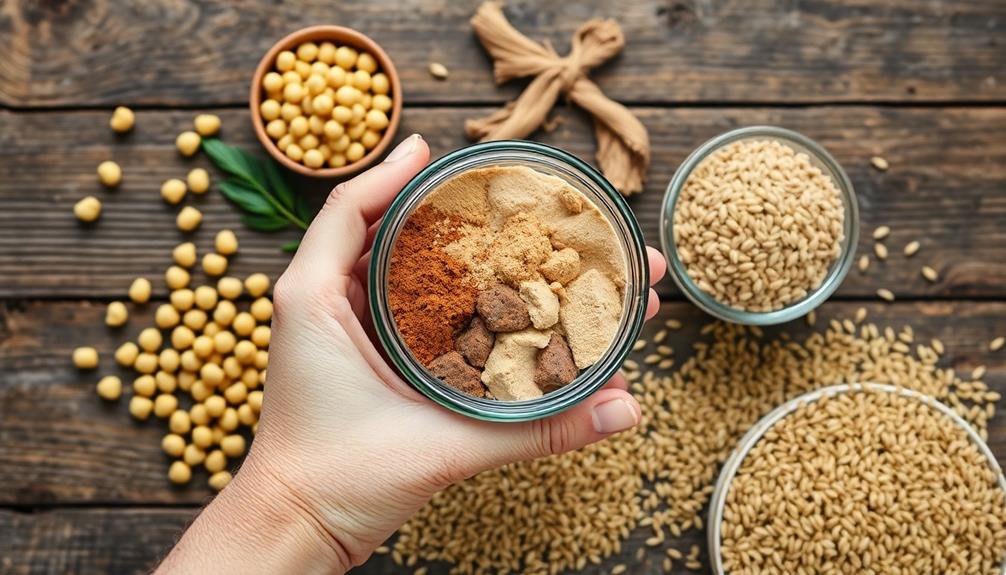
When you're on the hunt for the perfect organic protein powder, there's more to evaluate than just the flavor. You'll want to weigh factors like the protein source and quality, analyze the nutritional profile, and assess how well it mixes and tastes. Don't forget to check if it aligns with your dietary restrictions and look for important certifications that guarantee its purity and organic status.
Protein Source and Quality
Choosing the right organic protein powder begins with understanding the protein source and quality. You'll find a variety of options, from plant-based powerhouses like peas, brown rice, and chia seeds to animal-derived alternatives such as grass-fed whey. Each source brings its own unique amino acid profile and nutritional perks to the table.
When you're scanning labels, look for that coveted USDA Organic certification. It's your guarantee that you're not getting any unwanted synthetic additives, pesticides, or GMOs in your scoop. If you're leaning towards plant proteins, you'll often see blends designed to give you all nine essential amino acids – essential for those gains! Animal-based options typically come with a complete protein package already.
Don't forget to check for bonus ingredients like prebiotic fiber or probiotics. These can turn your protein shake into a gut-health hero! And here's a pro tip: give the texture a test drive. Plant proteins might be a bit grittier than smooth-operator whey, which could make or break your protein powder love affair. Choose wisely, and you'll be well on your way to supplement success!
Nutritional Profile Analysis
Now that you've got a handle on protein sources, it's time to zoom in on the nutritional nitty-gritty. When you're scouting for the perfect organic protein powder, there's more to take into account than just protein content (though that's important too!).
First up, protein power: Look for powders packing a punch with 20-30g per serving. This'll give your muscles the TLC they need after a grueling workout or serve as a satisfying meal replacement. But don't stop there! Check if your powder's playing matchmaker with different plant proteins – think peas, brown rice, and chia seeds. This dream team guarantees you're getting all nine essential amino acids.
Next, fiber up! Many organic powders are throwing in 6-10g of prebiotic fiber per serving. It's like a VIP pass for your gut health. And here's a sweet surprise – or rather, a lack thereof: most organic powders skip the added sugars and artificial nasties.
Bonus round: Some powders are going the extra mile with superfoods and probiotics. It's like getting a multivitamin and immune booster rolled into your protein shake!
Taste and Mixability
Two major factors can make or break your organic protein powder experience: taste and mixability. You'll want a flavor that tickles your taste buds without overwhelming them. Some folks swear by classic vanilla or chocolate, while others find these too sweet. It's a bit like Goldilocks – you're looking for that "just right" flavor that'll keep you coming back for more.
Now, let's talk texture. Nobody wants to choke down a gritty, chalky mess. You're aiming for smooth sailing here, folks! A good organic protein powder should blend seamlessly into your smoothies or shakes. But beware – even the best powders can turn into clump city if you don't mix them properly. Pro tip: Give that shaker bottle a good shake, or better yet, blend it up with some almond or oat milk for a creamy dream.
Dietary Restrictions Compatibility
Compatibility is key when selecting organic protein powders, especially if you've got dietary restrictions. You'll want to take into account your specific needs, whether you're vegan, gluten-free, or lactose-intolerant. Many organic options are USDA Organic and non-GMO certified, giving you peace of mind that you're avoiding synthetic additives that might clash with your health-conscious lifestyle.
If you're prone to allergies, keep an eye out for powders free from common allergens like soy and dairy. And for those of you watching your sugar intake, there are plenty of options with minimal or no added sugars to help you stay on track with your dietary goals. It's like finding the perfect dance partner – you want your protein powder to move in harmony with your nutritional needs!
Don't forget about your gut health, either. Some protein powders come with added bonuses like prebiotic fibers or probiotics. It's like getting a two-for-one deal on your health goals! By choosing a powder that aligns with your dietary restrictions and health objectives, you're not just fueling your body – you're treating it to a tailor-made nutritional experience.
Certifications and Purity
When it comes to organic protein powders, certifications and purity are your guiding lights. You'll want to look for labels that tell you exactly what you're getting—and what you're not. USDA Organic and Non-GMO Project Verified certifications are your best friends here. They're like a seal of approval, assuring you that your protein powder is free from synthetic pesticides and genetically modified ingredients.
But wait, there's more! If you're an athlete, keep an eye out for NSF Certified for Sport. It's like having a personal referee checking for banned substances. And for those of you with dietary restrictions, gluten-free and dairy-free labels are your ticket to worry-free protein consumption.
Now, let's talk about what you don't want in your powder. Artificial colors, flavors, sweeteners, and preservatives? No, thanks! You're better off without these synthetic add-ons. And here's a pro tip: look for products that undergo third-party testing for heavy metals and contaminants. It's like having a superhero sidekick, ensuring your protein powder is as pure as can be. Remember, when it comes to your health, it's always better to be safe than sorry!
Ingredient Transparency
Ingredient transparency is the backbone of trustworthy organic protein powders. When you're on the hunt for the best organic protein powder, you'll want to look for brands that lay all their cards on the table. Think of it as a protein powder strip tease—the more they reveal, the better!
First things first, check for those fancy certifications like USDA Organic and Non-GMO Project Verified. These little badges of honor mean your protein powder has passed some pretty rigorous tests. But don't stop there! Dive deeper into the ingredient list like a detective on a sugar-free stakeout.
Look for brands that spill the beans on where they source their ingredients. Are they proud to share their protein's origin story? That's a good sign! And while you're at it, keep an eye out for detailed nutritional info and third-party testing results. It's like getting a backstage pass to your protein powder's production.
Clear labeling is your best friend here. If a brand is hiding potential allergens or sneaky additives, it's time to swipe left. Remember, when it comes to organic protein powders, transparency isn't just nice—it's necessary!
Cost-Effectiveness and Value
Bargain hunters, listen up! When it comes to organic protein powders, you'll want to stretch your dollar without sacrificing quality. Let's immerse ourselves in the world of cost-effectiveness and value.
First, don't let sticker shock deter you. Sure, some premium options might set you back $2.25 per serving, but remember – you're investing in your health. Look beyond the price tag and consider the dollar-per-gram of protein ratio. It's like comparing apples to organic, superfood-infused apples!
Speaking of superfoods, keep an eye out for added bonuses like probiotics or exotic ingredients. These nutritional powerhouses can boost the value without breaking the bank. And don't forget to check for that USDA Organic seal – it's your assurance of quality, even if it comes with a slightly higher price tag.
Size matters, too! Larger containers often offer better bang for your buck. It's like buying in bulk at your favorite health food store. So, grab your calculator and do some quick math. Compare serving sizes and total servings to find the best deal. Your wallet (and muscles) will thank you!
Frequently Asked Questions
How Long Does Organic Protein Powder Typically Last Before Expiring?
You'll typically find organic protein powder lasts 12-24 months before expiring. However, it's best to check the label for specific dates. Once opened, you should use it within 6-8 months for ideal freshness and effectiveness.
Can Organic Protein Powders Be Used in Baking or Cooking?
Yes, you can bake and cook with organic protein powders. Mix them into pancakes, muffins, or smoothies. Blend them into sauces, soups, or dips. They'll boost your recipes' protein content while adding a subtle flavor.
Are There Any Potential Side Effects of Consuming Organic Protein Powders?
While generally safe, you might experience digestive issues like bloating or gas when consuming protein powders. You could also have allergic reactions if you're sensitive to specific ingredients. Always start with small amounts and monitor your body's response.
How Do Organic Protein Powders Compare to Non-Organic Options in Terms of Effectiveness?
Picture a protein-packed punch! You'll find organic and non-organic options pack a similar punch regarding effectiveness. However, organic powders offer a cleaner, pesticide-free profile that might give you peace of mind while fueling your gains.
Can Children or Pregnant Women Safely Consume Organic Protein Powders?
You should consult your pediatrician or obstetrician before giving protein powders to children or using them during pregnancy. While organic options may be safer, they're not always necessary or recommended for these groups. Individual needs vary.

